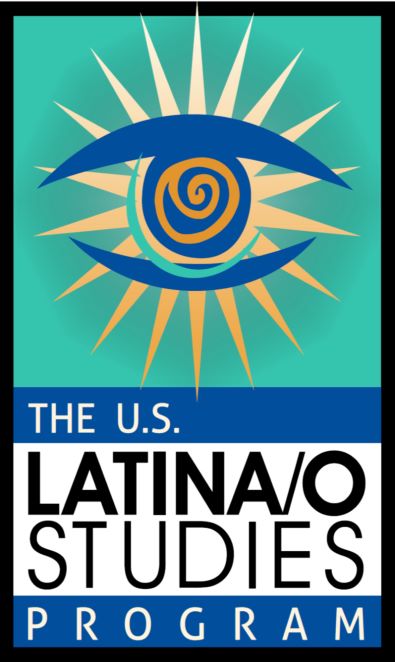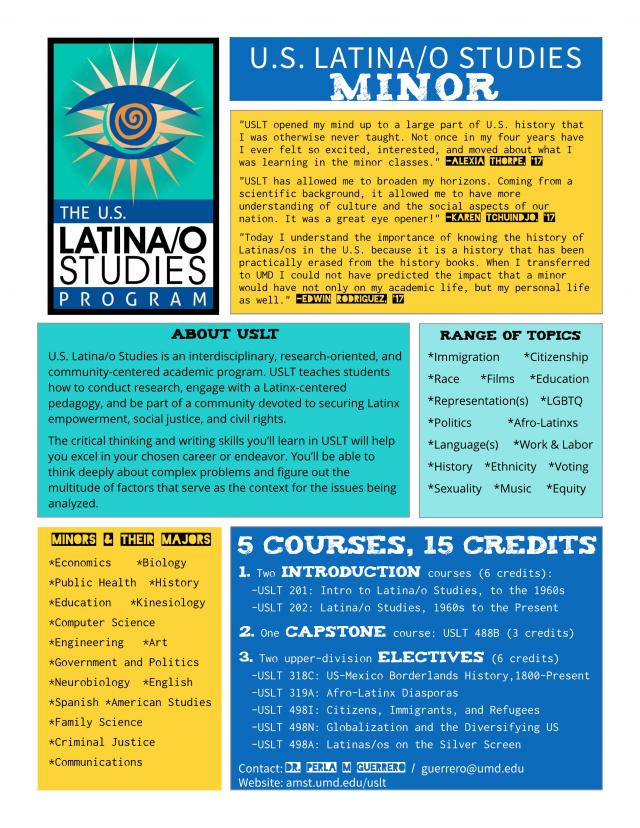U.S. Latina/o Studies Minor
We engage with the histories, communities, and experiences of Latinas/xs/os.

Our Mission and Philosophy
The U.S. Latina/o Studies (USLT) Program at the University of Maryland is a multi-disciplinary program that provides students with the opportunity to critically study and engage with the histories, communities and experiences of Latina/os.
The USLT Program is an interdisciplinary, research oriented and community centered academic program that examines the extensive history and transnational experiences of Latina/os in the United States. The USLT program expands and reconfigures multiple disciplines, research practices, theories and methodologies that enable a rigorous and thorough understanding of the dynamic and ever-changing field of Latina/o studies.
The USLT program is simultaneously committed to providing the tools, support and research necessary to promote a Latina/o centered pedagogy, public service and activism needed to ensure empowerment, access and visibility of Latina/os at the University of Maryland, in the surrounding communities and throughout the state.
The minor in U.S. Latina/o studies provides students with the opportunity to study critically the broad range of experiences of Latinas/os in the United States.
About the USLT Minor
Description
Why is the DMV home to a large community of Central Americans versus Los Angeles that is majority Mexican American versus New York that has large Puerto Rican and Dominican communities? What have been some of the obstacles Latinxs have had in the United States and what have been some triumphs? Why do some Latinxs speak only English or Spanish or an indigenous language y otros hablan espanglish (and others speak Spanglish)? Why are Latinxs represented in popular culture as maids, cholos, or cooks and rarely as business owners or professionals? These and other questions are what the USLT courses explore.
The minor addresses issues pertaining to historically recognized U.S. Latina/o subgroups, including Mexican Americans/Chicanos, Puerto Ricans/Nuyoricans and Cuban Americans, as well as distinct local and regional communities such as Salvadoran Americans, Guatemalan Americans, Colombian Americans, Afro Latinas/os and others. Through an interdisciplinary and multidisciplinary approach drawing from various comparative critical frameworks, students examine the histories, communities and cultures of Latinas/os both as distinctive group formations as well as interconnected with the broader themes of diversity, ethnicity, race, class, gender, sexuality and immigration in the U.S. The interdisciplinary and multidisciplinary minor prepares students to understand recent demographic and cultural transformations of Latino populations in local, regional and national contexts.
The minor, which requires a total of 15 credits, is intended for students who wish to develop a specialization in U.S. Latina/o studies alongside their degree pursuits. It is optimal for students engaged in work with U.S. Latina/o communities in a variety of professions and academic fields including history, literature, education, urban studies and planning, health care, social services, business, government and public policy, among others.
USLT At-A-Glance
Requirements
A. Two Lower-Level Courses (6 credits)
All students are required to take the two foundational courses:
USLT201: ”U.S. Latina/o Studies I: An Historical Overview to 1960s”; and
USLT202: “U.S. Latina/o Studies II: A Contemporary Overview, 1960s-Present.”
These courses engage students with the disciplines, debates and methods that constitute the field of U.S. Latina/o studies. Students acquire an historical understanding of why various Latina/o peoples immigrated to the United States, how those already living within the geopolitical borders of the United States adjusted to (neo)colonization, how Latina/o immigrants and their descendants have been treated in American history and how they have responded to such treatments. This approach is not merely additive, but potentially transformative in the manner in which it expands the boundaries and revises the conceptualization of United States history.
USLT201: “An Historical Overview to 1960s” is an interdisciplinary course in which students learn about the history of Latinos/as in the U.S., about how Latinos/as construct “Latinidades,” that is, Latino/a identities in the United States, and about current issues in Latino/a Studies. The course begins with a general examination of terminology associated with various Latino subgroups, including Chicanos, Puerto Ricans, Cuban Americans, Dominicans and Central Americans. Through readings of poems, short stories, autobiographical narratives, novels and other materials, students will explore the history and cultural expressions of these groups. Attention will be paid to U.S. Latina/o cultural expressive practices such as music (e.g., corridos, salsa, spoken word, etc.) and visual images in art, video, film and photography, among other things. Students will be expected to engage critically and creatively with the materials of this course. At the end of the semester, students will produce an individual project on an aspect of Latina/os in the U.S. and/or the Greater Washington, D.C., metropolitan area that pertains to the history of that community before 1960. They will present their findings in panel format during the last weeks of classes.
USLT202: “A Contemporary Overview: 1960s-Present” is an interdisciplinary course on emerging populations of Latinos beginning in the 20th century U.S. with a focus on the multiple waves of Latino immigration as a result of colonialism, imperialism, globalization and community-based social movements. It examines the positioning of immigrant waves in the political, socio-cultural and historical contexts of U.S. Latinidades. Apart from providing students with grounding in the historical knowledge of a particular people, place and time, this 200-level course will help students develop certain skills including the ability to critically analyze the writings and arguments of historians, social scientists and other interdisciplinary scholars. Discussions, lectures and writing assignments are designed with these goals in mind. At the end of the semester, students will produce an individual project on any aspect of Latinos/as in the U.S. and/or the Greater Washington, D.C., metropolitan area. They will present their findings in panel format during the last weeks of classes. Ultimately, this course is about how Latinos/as construct Latinidades, that is, Latino/a identities in the geo-political borders of the United States.
B. One Upper-Level Course (3 credits)
All students are required to take the upper-level course: USLT488: “Senior Seminar in U.S. Latina/o Studies.” This variable topics seminar exposes students to interdisciplinary critical readings, writing and research in U.S. Latina/o Studies. This course broadly addresses interdisciplinary research methodologies. Students will gain skills and practice in reading critical analytic texts and will develop writing skills. Students will work closely with the instructor and the McKeldin Library subject area specialist in U.S. Latina/o Studies.
C. Two Upper-Level Elective Courses (6 credits)
In addition to the three required foundational courses, students will select two elective courses in consultation with the USLT advisor, one from each of two of the following categories: Humanities; Social Sciences; Languages; and Education.
For these electives, students can choose USLT498: “Special Topics in U.S. Latina/o Studies” and from a list of pre-approved courses offered through other departments or programs. Elective courses will explore the historical, cultural, political, economic and sociological dimensions of U.S. Latina/o experiences.
Additional courses that include comparative U.S. Latino content, such as in LASC, GVPT or AMST, would be eligible for inclusion in the minor with the approval of the USLT advisor. Each semester, in advance of pre-registration, the USLT advisor will circulate a list of courses with U.S. Latino content for the next semester.
Eligibility and Application Process
In order to apply for the minor in U.S. Latina/o studies, students must have:
1. Completed at least 30 credit hours prior to application to the program
2. Completed USLT201 or 202 with a C (2.0) or better
3. Applied before the add/drop deadline in a given semester.
The U.S. Latina/o studies minor can be a flexible complement to a student’s four year course of study.
Restrictions
A student may use a maximum of six credits (or two courses) to satisfy the requirements of both a major and a minor.
Courses completed in one minor may not be used to satisfy the requirements in another minor. No more than six of the required credits (or two courses) may be taken at an institution other than the University of Maryland, College Park. However, at least six upper division credits applied to the minor must be taken at the university.
No course with an earned grade below “C” (2.0) may count towards a minor.
Student Testimonials
Erica Puentes Martínez ’18, African American Studies:
I've used the skills and information taught in USLT to inform my activism and develop my personal political philosophy…. I encourage anyone, regardless of background, with an interest in developing their critical thinking skills, to take USLT courses. In the future, I hope to become an agent of change for my community and serve my community politically.
Imani Cabassa ’17, Kinesiology:
To say the least, the US Latino Studies has taught me the most about myself. I have learned about the histories of my culture, and the histories of those who came before me and how the histories of US Latino culture will affect the future. Coming from a major that is majority science-based USLT gives me a platform where I can express myself through the world around me about culturally driven topics and politics that matter.
Edwin Rodriguez ’17, Criminology and Criminal Justice:
As a USLT minor, I have been exposed to a vast history of Latinas/os in the U.S. that I had not known before. Today I understand the importance of knowing the history of Latinas/os in the U.S. because it is a history that has been practically erased from the history books. Latinas/os are often cast as “problems” and as a community of “recent arrivals” and their rich history in the U.S., dating back to nearly the 18th century, is never fully represented in popular culture. In USLT, however, this history is very much alive and professors like Dr. Guerrero and Dr. Mirabal have inspired me to further my knowledge of this history through graduate-level research.
When I transferred to UMD in the fall of 2015, I could not have possibly predicted the impact that a minor would have not only on my academic life, but my personal life as well. But most importantly, being a USLT minor has given me great insight into what I want to do in life and that is truly a special feeling. Now I know that research is a key component for enacting positive change, and USLT has given me the skills necessary to be a part of this change.
Declaring the USLT Minor
If you’re interested in possibly declaring the minor, please email Dr. Rob Chester (rchester@umd.edu) to set up an appointment where he can answer any questions you have, what USLT offers, and how it can complement your major.
Advisors & Hours Office
Dr. Rob Chester (rchester@umd.edu): by appointment (2331 Tawes Hall)
Dr. Perla Guerrero (guerrero@umd.edu): by appointment (2329 Tawes Hall)
Dr. Nancy R. Mirabal (nmirabal@umd.edu): by appointment (3329 Tawes Hall)
Faculty
Robert Chester
Senior Lecturer and Interim Director of U.S. Latina/o Studies, American Studies
1324 Tawes Hall
College Park
MD,
20742
Perla Guerrero
Associate Professor, American Studies
Affiliate Faculty, Latin American and Caribbean Studies Center
2329 Tawes Hall
College Park
MD,
20742
Nancy Mirabal
Associate Professor, American Studies
Affiliate Faculty, Latin American and Caribbean Studies Center
3329 Tawes Hall
College Park
MD,
20742


